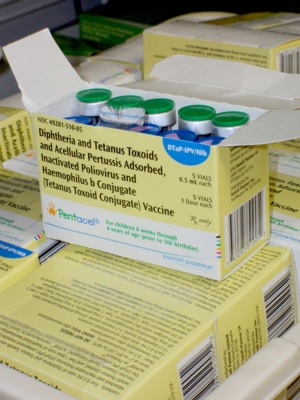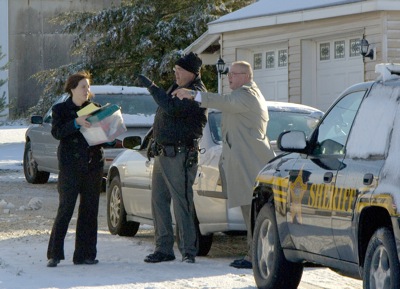Thursday, December 1st, 2011
More Grand Lake area parents say no to vaccines
By Shelley Grieshop

Photo by Shelley Grieshop/The Daily Standard
A recent U.S. study shows an increase in the number of parents opting not to have their children vaccinated due to health, religious or other factors. In Mercer County, about 15 percent of children have received no or only a few of the recommended immunizations.
Health fears, misinformation and other factors are swaying parents to skip vaccinations for their children, a local official said.
About 15 percent of children in Mercer County have received no immunizations or only a select few, according to Joyce Jansen, director of nursing at the Mercer County-Celina City Health Department. The number has increased only slightly in recent years, she added.
"I think a lot of people are getting their information (about vaccinations) from the Internet, friends or family members; and it's not always accurate," she said.
All states allow parents to decline vaccinations for their school-age children based on medical, religious, philosophical and moral convictions. In Ohio, parents are required to submit signed waivers to school officials if their children aren't immunized.
In eight states, excluding Ohio, more than 1 in 20 public school kindergartners haven't received all the vaccines required for attendance, according to a recent Associated Press study. However, childhood vaccinations remain high across the U.S. at 90 percent or better for polio, measles, hepatitis B and chickenpox, the study showed.
Health officials in Mercer and Auglaize counties say the most expressed reasons parents opt out is the long-held fear of developing autism and the chemicals found in the vaccines.
Trish Fisher, owner of Nature's Corner in Fort Recovery, is one of 14 siblings who never received vaccinations. Her own three children and 32 nieces and nephews also remain vaccine-free, she said.
"I believe if you start off by breast-feeding a child, it helps ward off disease naturally," said Fisher, who sells herbs and supplements at her store.
The chemicals used in vaccines are not natural and can be harmful to the body, especially infants, she said. She and her siblings remain healthy, despite contracting childhood diseases such as mumps, whooping cough and measles, she said.
"And we survived," she added.
If today's parents follow the recommendations handed down by the Centers for Disease Control (CDC) and Prevention, children are stuck with a needle 15 times and given three oral doses of drugs before entering kindergarten.
Jansen fears increases in vaccine exemptions could lead to outbreaks of diseases that previously were eradicated in the U.S. She also doesn't want parents to face regret if their child contracts a vaccine-preventable disease.
Jansen admits that no vaccine is 100 percent safe and some children will have reactions.
"Everyone's immune system is different," she said.
But side effects such as fever are almost always less serious than the actual disease, she added.
Children who are vaccinated can get diseases such as pertussis from unvaccinated children. However, vaccinated children tend to have milder cases, she said.
The fear of autism remains high on the list as the reason parents refuse immunizations. According to the Centers for Disease Control and Prevention, vaccines do not and never did cause autism. The debate started when a study was published decades ago linking autism to mercury in the measles, mumps and rubella vaccine. An independent panel eventually concluded the study was flawed.
Brenda Eiting, an immunization nurse with the Auglaize County Health Department, refused to estimate the number of children not immunized in the county.
"I think the number fluctuates a lot depending on stories in the media," she said.
Parents often tell her they don't trust the chemicals in the vaccines and question the reason why the number of recommended immunizations continues to grow. She tells them it's based on advances in modern medicine. People trust new cancer treatments and other medical breakthroughs "and this is no different," she added.
"If there's one thing I could say to a parent it's that I wouldn't recommend anything that I wouldn't give my own children," Eiting said.
She understands the apprehension but urges parents to get the facts.
"They (parents) are their children's advocates and need to educate themselves on the subject," she said.
Health officials in both counties have hand-outs available for parents seeking vaccination information. Jansen also encourages a visit to the website of The Children's Hospital of Philadelphia and its Vaccine Education Center.

